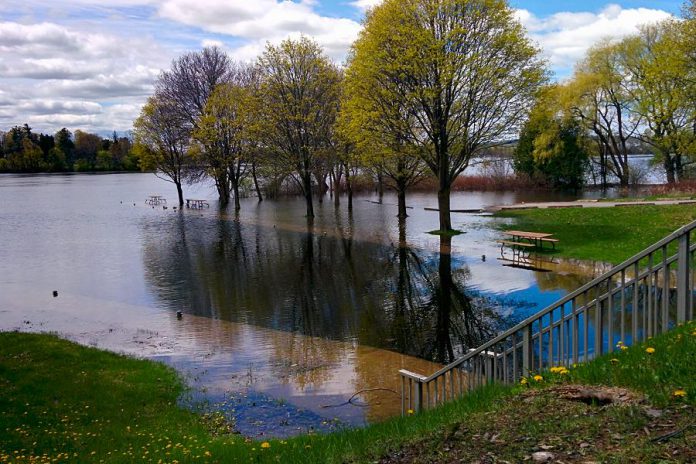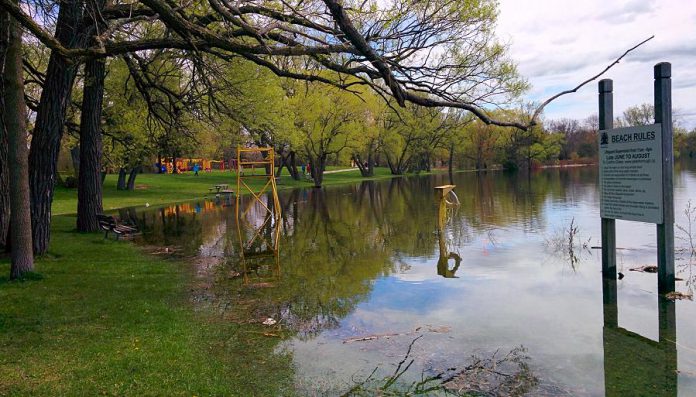
I arrived home from work last Friday to the unwelcome surprise that my sump pump was engaging every 1-3 minutes. As the rain kept falling last week and the ground became more saturated, I started clocking the length between pumps to try and gauge whether the water was flowing faster into my basement.
I have received a small amount of water in my unfinished basement each spring and I am prepared for some dampness, but this kind of water flow was something that I was not ready for.
Earlier in the week I was worried when it was engaging every 20-30 minutes, so to be pumping that often was quite unsettling.
So, Friday night I experienced a very restless sleep; the sump ran all night. I worried that the water would rise and flood out my camping gear along with bins of photo albums, winter clothes, and some unused furniture that I store in the basement.
I formulated a plan between bouts of intermittent sleep. At 7 a.m. on Saturday morning, I was out in the yard in my rubber boots and rain jacket, hard at work checking the eaves troughs and installing my rain barrel.
Rain barrels are great for collecting water from the eaves of the house to use on the garden later. They are also great for slowing water down during rain showers. During high volume rain events like we have been experiencing you can attach a hose and open the spigot slightly, to direct the flow of water further away from your home. This also prevents the barrel from overflowing, which could also cause flooding around your foundation.
My next task was to move as many of my storage bins in the basement up onto shelves and the remainder of them up the stairs to the main floor. This cleared the concrete floor from inhibiting water flow to the sump. I turned on the fans and a dehumidifier and connected them to timers to utilize off-peak energy times.
While the water kept flowing all weekend, and the sump kept pumping, I did get some piece of mind knowing that I did everything I could to prevent damage to my belongings in the short term, but what about the long term?

As the climate changes, are we likely to experience more extreme weather events like flooding?
“It is important we all feel ready for rain, and ready for a lack of rain, as we proactively adapt to changing weather patterns associated with Climate Change,” explains GreenUP Water Programs Manager Heather Ray.
“The Peterborough Climate Change Action Plan, along with the Ontario Climate Change Action Plan, and the Federation of Canadian Municipalities (along with many more international, regional, and local institutions) recognize that the weather is changing due to climate change, and we can expect more extreme weather events resulting in more flooding and drought conditions for our community.”
I feel fortunate that only a few of my belongings fell victim to the current flooding, but many people living closer to Jackson Creek and the Otonabee River are dealing with fully flooded basements, rising water levels, boil water advisories, and the stress of more rain in the forecast.
How can we all prepare for the long term changes in climate that we will likely see, and protect our homes from flood damage before it happens? Rain Community Solutions offers some practical ideas to help prevent water damage in your basement with pro-active solutions that manage rainwater on your property by slowing it down, soaking it up, and keeping it clean.
Installing rain barrels, sloping the ground away from your foundation, cleaning eaves troughs regularly, and directing downspouts to at least 2.4 metres away from your home and onto permeable surfaces are all helpful ways to slow down water around your home.
To soak up more water before it flows to your basement, consider installing a rain garden in your yard. Rain gardens are uniquely designed to use soil and carefully selected plant species to capture and absorb rainwater while filtering pollutants that are often picked up in urban areas from roofs, driveways, and roads.
Keeping water clean helps to keep your home healthy, and our waterways, too. For example, disposing of old paint cans, and toxic cleaners at the household waste depot will ensure that they aren’t left in the basement where flooding could cause spillage and seepage into your home.
During flooding events, it is also important to conserve water. Over 100mm of rain has fallen in Peterborough since May 1st, which is more that we usually receive in the entire month of May!
While it might seem unnecessary to save water during such an influx of it, right now it is crucial to use less water in your home to protect the infrastructure that we use to treat our wastewater. Last week, an influx of rain and storm water to the system caused the wastewater treatment facility to be at capacity and was therefore forced to release water into the Otonabee River before it received secondary treatment.
Conserving water in the home will help reduce the strain on the wastewater treatment plant. You have likely heard all these water-saving tips before, but saving the laundry for another time, having very short showers, flushing less, and turning off the tap while you brush, shave, and wash dishes will certainly help.
Many of us will continue to manage the water in our yards and homes over the next few weeks. To try and minimize the stress associated with the ongoing flooding, I will be reminding myself that the sound of the sump pump going off means it is working! In the longer term, I will be considering some water-wise landscaping options to mitigate larger-scale flooding that is likely to happen again.
For more information about Rain Community Solutions, installing rain gardens and rain barrels, or any of GreenUP’s diverse water programs including Ready for Rain Peterborough and Water Wise, please contact Heather Ray, GreenUP Water Programs Manager at heather.ray@greenup.on.ca or 705-745-3238 ext. 204.


























